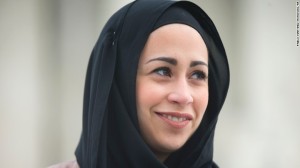Photo: The U.S. Supreme ruled today that Samantha Elauf has a legal right to wear a head scarf on the job, and can sue the employer who refused to hire her because its dress code prohibits head scarves.
The Supreme Court ruled today that a 17-year-old Muslim woman turned down for employment by Abercrombie & Fitch because her religious head scarf didn’t comply with the retailer’s dress code can sue the company for discrimination under the federal Civil Rights Act.
The vote was 8-1, with Justice Clarence Thomas dissenting.
This decision isn’t surprising in light of the court’s recent rulings in Hobby Lobby and other religious cases. The court has consistently strengthened individual religious rights in this term.
Head scarves are a flashpoint in Muslim/non-Muslim social tensions, not only in the U.S., but also in Europe and throughout the world, where Muslim governments make you wear them and non-Muslim governments don’t let you wear them. In the U.S., today’s ruling probably means schools, gyms, and businesses can no longer exclude Muslim women for wearing head scarves, or order them to take them off.
But I would argue the significance of this decision is even larger. At a time when American conservatives are encouraging hostility against Muslims, and are claiming America is a “Christian nation,” trying to break down the separation of church and state, and establish Christianity as our country’s official religion, the Court with this ruling has sent a clear and unmistakable message that Muslims have the same rights as everyone else, and the Court will enforce those rights. This ipso facto rules out giving Christians any special legal privileges, such as the “right” (asserted by some) to put Ten Commandments monuments on public property while excluding the symbols of other religions.
